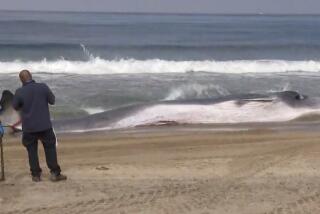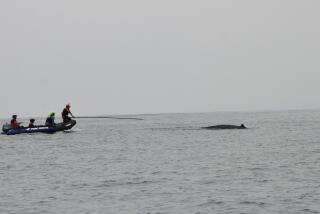Dozens of whales trapped in Everglades National Park; 10 die
Ten short-finned pilot whales were dead and more than 40 marooned in shallow water in a remote area of Everglades National Park in Florida, and officials warned Wednesday they were not likely to survive.
“Most of these mass strandings that occur do not have a successful outcome, and we’re lucky if we’re able to even save a couple,” said Blair Mase, southeast marine mammal stranding coordinator for the National Oceanic and Atmospheric Administration.
The whales are at the western boundary of the park, more than 20 miles from their deep-water habitat and about two hours from the nearest boat ramp. They may have been stuck in shallow water for days, Mase told reporters.
Attempts to herd the animals away failed, in part because returning to their habitat requires the whales to traverse sandbars and shallow water, she said.
The stranded whales were reported about 4 p.m. Tuesday, too late to get a rescue team there before nightfall.
When rescuers arrived Wednesday morning, six whales were dead and 45 still swimming. Four were “very compromised and in very poor conditions,” Mase said. The team decided to euthanize the four, bringing the death toll to 10.
A team of 25 - made of up of people from the National Park Service, the Marine Mammal Conservancy, the Fish and Wildlife Conservation Commission, the National Park Service and NOAA - are assessing the whales’ condition.
Mase said the people on scene were trying to figure out what caused the first six whales to die. Rescuers will make further decisions about how to proceed Thursday.
The pilot whale is the most common species that mass strands in Florida, Mase said. Twenty-two were stranded in 2012, and 23 in 2011.
An adult weighs between 2,000 and 6,000 pounds.
Short-finned pilot whales typically travel in groups of 25 to 50, according to the NOAA fisheries website. The large groups make it even more difficult to herd them out of a dangerous area, Mase said.
All marine mammals are protected by the Marine Mammal Protection Act of 1972, but as a species, short-finned pilot whales are not endangered.
This group is threatened by circumstance, however.
“We want to set expectations low because the challenges are very, very difficult - the environmental challenges, the resource challenges, the location of the whales,” Mase said. “The outlook does not ultimately look good for the remaining live whales.”
Twitter: @skarlamangla
soumya.karlamangla@latimes.com
More to Read
Sign up for Essential California
The most important California stories and recommendations in your inbox every morning.
You may occasionally receive promotional content from the Los Angeles Times.











